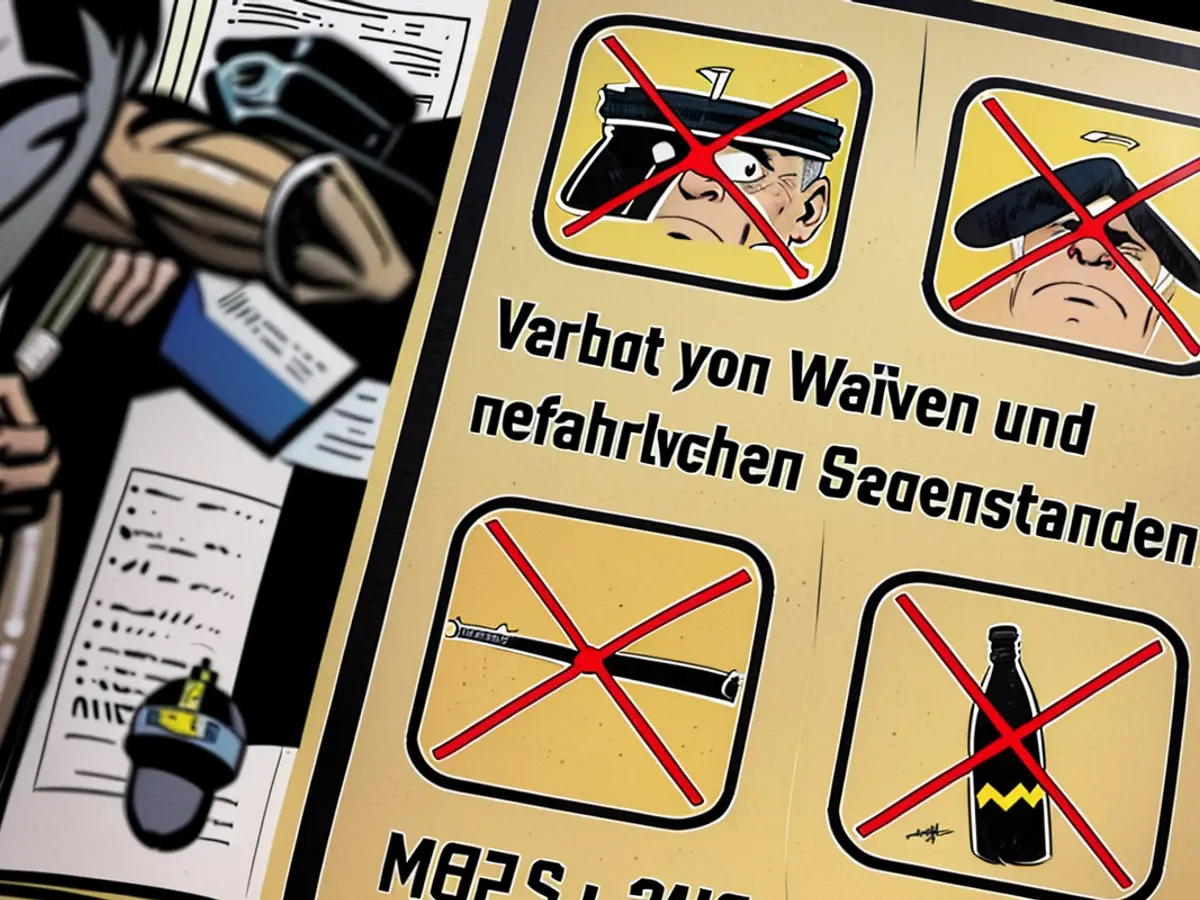- Discussion on Enhancing Knife Regulations Gains Traction
Following the stabbing incident in Solingen and prior to the state elections in eastern regions, there appears to be momentum in the stagnant coalition debate over stricter knife regulations. Federal Justice Minister Marco Buschmann announced negotiations on knife regulations. "We will now discuss within the government how we can further advance the fight against this kind of knife-related violence," said the FDP politician to "Bild am Sonntag". So far, the FDP has rejected proposals from Interior Minister Nancy Faeser for stricter restrictions.
The SPD calls for a significant tightening of legislation, while Vice Chancellor Robert Habeck (Greens) and the opposition Union party support this demand. The main challenge with potential stricter knife carry regulations is their enforceability, such as the capabilities of law enforcement in public spaces.
A knife attack at a Solingen city festival left three people dead and eight others injured, four of them seriously, on a Friday evening. The Federal Prosecutor's Office is investigating the suspect for murder and suspected ties to the Islamic State (IS).
The upcoming elections in Thuringia, Saxony, and Brandenburg in September could inspire these recent political statements. Politicians in the traffic light coalition and the Union are concerned about further gains in popularity for parties like the AfD or the Sahra Wagenknecht (BSW) alliance.
Habeck: No more medieval times
Economy Minister Robert Habeck (Greens) stated: "Whether the horrific incident in Solingen could have been prevented with stricter rules, that is unclear." However, some degree of legal tightening is appropriate and necessary. He added: "More knife-free zones and stricter knife regulations - bladed and pointed weapons are not necessary in Germany's public spaces. We no longer live in medieval times."
Klingbeil: Explore all avenues against knife violence
SPD leader Lars Klingbeil told "Bild am Sonntag" about the incidents in Solingen: "This apparent terrorist attack demonstrates: Germany has a problem with knife violence." He demands a near-complete knife ban on streets: "In my opinion, there is no justification for people carrying stabbing weapons in day-to-day life. All possible measures must be taken to rid Germany's streets and squares of knives." SPD faction vice Dan Wiese advocated for more knife-free zones, extending the carrying ban for convicted individuals, a knife ban on public transportation, and quick prosecution of violations.
Union faction calls for random knife searches
The Union faction is pushing for random knife searches. The parliamentary manager of the Union in the Bundestag, Thorsten Frei (CDU), told the "Rheinische Post" (Monday): "Instead of just publicly arguing about the right course, the federal government should act." Faeser and Buschmann "must now finally present a feasible plan for how they intend to effectively combat increasing knife violence among young men." This could involve knife-free zones and tightening of the weapons law, along with more police powers, enabling random knife searches. Brandenburg's CDU leader calls for expanded police powers.
Brandenburg's CDU state and faction leader Jan Redmann demanded: "We can only achieve higher security at folk festivals through modern video surveillance with facial recognition and random bag checks." Redmann aims to become Minister President in the state election on September 22.
AfD faction: Discussion of knife-free zones is absurd
The interior spokesman of the AfD federal parliamentary faction, Gottfried Curio, accused Interior Minister Faeser of only focusing on "fundamental unwillingness to address the real causes of such a high level of violence affinity among an increasingly larger perpetrator clientele" with her "absurd talk of knife-free zones."
The number of knife attacks in Germany has significantly increased in recent years, sparking a nationwide debate about this type of violence. In 2023, the police reported 8,951 incidents of serious bodily harm involving knives, either through injury or threat - an increase of almost 9.7% compared to the previous year.
According to Faeser's proposals, knives should only be allowed in public up to a blade length of six centimeters instead of the current twelve, and there should be a general ban on carrying dangerous switchblades.
The medical director of the municipal clinic in Solingen, Thomas Standl, told Welt TV that this was a "false sense of security." "This is a debate that, in my opinion, does not really take us anywhere," he said. "Especially in the neck area, even three to four centimeters can hit the large carotid artery in normal individuals." The hospital is treating four of the individuals injured on Friday evening.
Weapon and knife-free zones
A spokesperson for the Federal Ministry of the Interior explained that tightening the weapons law could only be part of a comprehensive approach to combating knife crime. Knife bans must be consistently enforced, as the federal police do at train stations. Additionally, weapon and knife-free zones should be established by local authorities in areas with a high risk of violence.
In late May, for example, an Afghani man in Mannheim injured five members of the Islam-critical movement Pax Europa and a police officer with a knife. The officer later died. In mid-June, a 27-year-old Afghani man in Wolmirstedt, Saxony-Anhalt, was shot by police after stabbing a 23-year-old and then injuring several individuals at a private EM garden party.
The recent knife attack in Solingen has brought up concerns about knife-related violence in Germany, leading Politicians like Economy Minister Robert Habeck to call for more knife-free zones and stricter knife regulations, stating that "we no longer live in medieval times." Despite this, the main challenge is the enforceability of potential stricter knife carry regulations.
The SPD leader Lars Klingbeil demanded a near-complete knife ban on streets, stating that there is no justification for people carrying stabbing weapons in day-to-day life. This call for stricter measures comes in response to the Solingen incident and the rising number of knife attacks in Germany.








